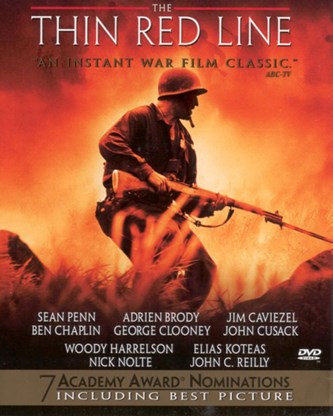THIN RED LINE
 "War does not ennoble man, it makes him a rabid dog, it poisons his soul…...We were a family. How could it break and split and now we are against each other, each one giving shade to the other? How did we lose the good that had been given to us, let it slip away, disperse, destroy itself? What prevents us from going out, touching the glory?”
"War does not ennoble man, it makes him a rabid dog, it poisons his soul…...We were a family. How could it break and split and now we are against each other, each one giving shade to the other? How did we lose the good that had been given to us, let it slip away, disperse, destroy itself? What prevents us from going out, touching the glory?”
“All lies. Everything you see, everything you hear. They only get there, one after the other. You find yourself in a cage, a cage that goes this way and that. They want you dead ... or part of their lie. A man can do only one thing, find a situation that is his own, create an island around it.”
From The Thin Red Line by Terrence Malick.
A platoon of marines attacks a Guadalcanal hill. It was the most difficult and bloody battle of the war in the Pacific, due to the nature of the land and the strategic importance attributed to that small island. Soldiers advance and face desperate situations. Malick translates the thoughts of the soldiers, creating abstract speeches on good and evil, on love, destiny— all this in the midst of battle. We come from the historical period, longer than ever, marked by the absence of degrees of conflict. The battles today are not fought with arms but on an economic level. During the Cold war with Russia, no shots were fired, yet the situation was very tense. Now it seems that the United States wants to re-adopt a similar scheme with China
On Friday, after the duties on steel (25%) and aluminum (10%), US President Donald Trump announced a $ 60 billion tariff package on 1,300 products, mostly tech. The country of the Great Wall has exported in 2017 tlc devices for 241,7 billion dollars, of which 106,7 of that billion went to the United States. To make a comparison, Germany has exported 176.5 billion cars all over the world.
Duties are never a linear, surgical instrument. Smart bombs, even in economics, do not exist. To understand precisely the impact of a trade war, just one example for everyone, a product that is often in our pockets. The iPhone X costs $370, but is sold at $1,200. Approximately one third of the cost, $ 110, collects them for the supply of the screens, the Korean Samsung (Apple's first competitor on mobile phones). $44 go to the Japanese Toshiba and the Korean Sk Hynx for the chips. Other suppliers arrive from the USA, Europe, Taiwan. Only 3-6% of the costs go to the Chinese Foxconn. The problem is that, in official statistics, another situation appears, almost the entire cost is attributed to China, because it is the country that assembles them.
"All lies ... a man can do only one thing, find a situation that is his own, create an island around". It is no longer clear who the true protectionist is, who isolates himself or who the is real victim. An economist, like Allen Sinai, compares the situation to a skier in the upper part of the track; "He can start with caution, but he knows that his speed will only increase". The vicious circle will start in the US, China responds with a further closure. The second round of duties will be more dangerous and will involve everyone, including Europe.For now, it seems to be the United States will use the stick and the carrot. US Treasury Secretary Mnuchin thought of throwing water on the fire over the weekend, declaring that the government "is having very productive dialogues with China" and "to be cautiously optimistic about the possibility of reaching an agreement" that avoid the application of duties.
The stock exchanges reacted well. No collapse but moderate optimism after last week's red. The tensions also had repercussions on commodity prices, with the rise in oil prices despite the increase in drilling in the US. The Brent is therefore trading around $70 a barrel. Tonic, the precious ones with the gold steadily above the $ 1,340 an ounce. On the agricultural sector, cocoa still stands out as the best commodity since the beginning of the year (+ 40%), rising to a maximum since November 2016 on tensions related to supply in Africa. In short, more than a war, as many are flaunting, it seems that the two superpowers are dealing along a thin red line. With tones sometimes higher than necessary, the door of dialogue always open. They are all well aware of being elephants moving between the crystals.
But if wars were once fought on the soldiers' skin, today they are at risk. It's not about life or death but about money and jobs. A thin red line between a capital gain and a capital loss. In order not to burn yourself it is better not to go to the front line but to rely on a solid diversification strategy; aware that no one ever wins in war.
